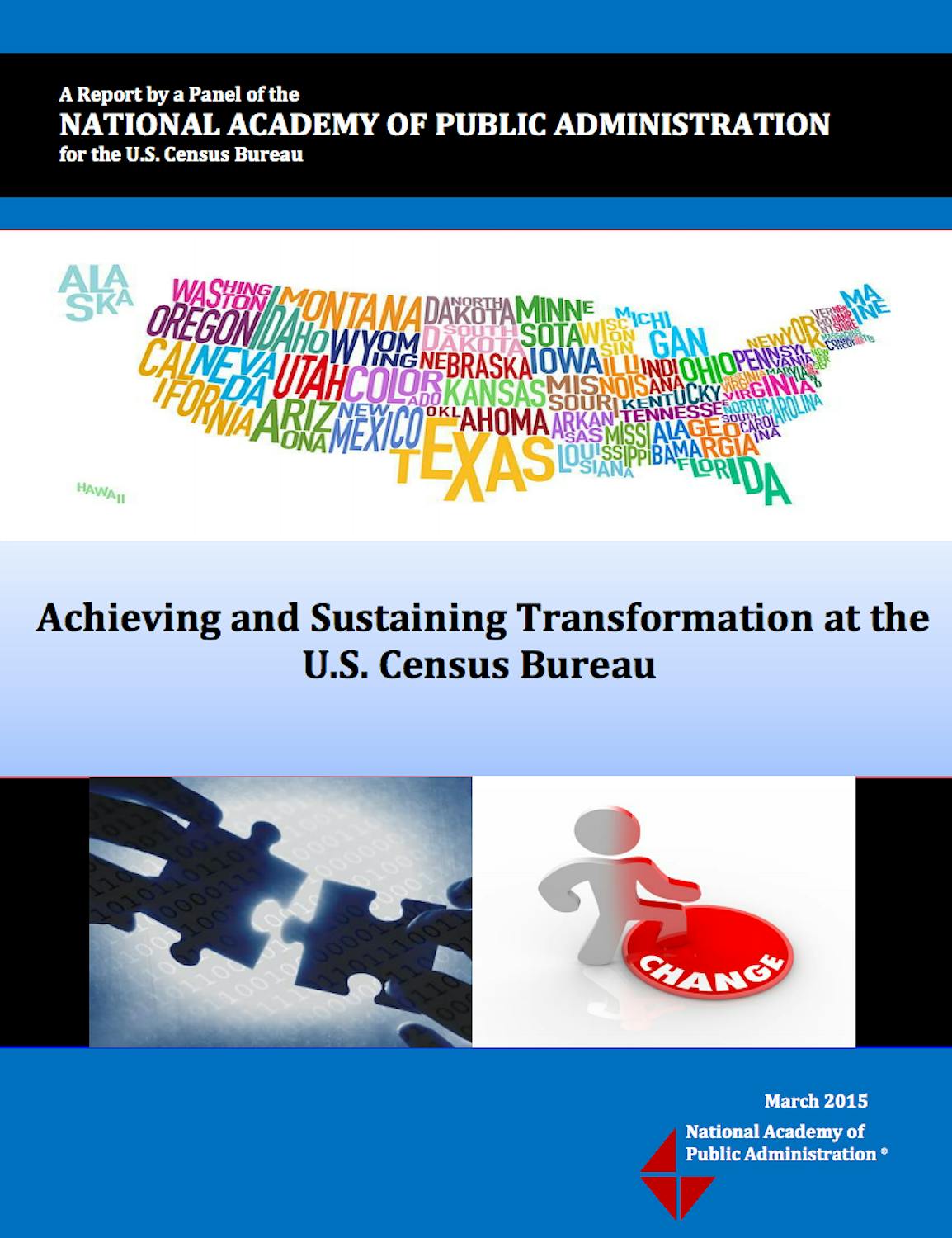
Achieving and Sustaining Transformation at the U.S. Census Bureau
The Census Bureau has initiated organizational changes intended to improve its ability to provide quality data while enabling it to anticipate and readily adapt to future needs. The Census Bureau requested that the National Academy of Public Administration (the Academy) conduct an independent assessment and recommend practical actions needed to increase the likelihood that its transformation will be successful and sustained.
The Academy convened an expert Panel of five Fellows, chaired by Janice Lachance, with vast experience in the federal government, private sector, and academia. The Panel utilized its knowledge of organizational change management in its assessment of the Census Bureau’s efforts, providing the Bureau with pragmatic recommendations as the agency continues its transformation.
Click the button below to view the View Study Report.
View ReportKey Findings
During its six-month study, the Panel identified 16 recommendations concerning the Census Bureau’s transformation. The Academy Panel’s report provides practical recommendations focusing on key elements associated with effective organizational change in the areas of planning, communication, governance, matrix management, resource allocation, institutionalizing innovation, and workforce planning. The recommendations are intended to increase the likelihood that these organizational changes will be successful and sustained.
Recommendations
- Census Bureau leadership should continue its efforts to document the prioritization of the five transformation initiatives and their component projects, critical dependencies, and contingency plans.
- The Census Bureau should continue its efforts to develop plans for communicating transformation initiatives and their implications for Bureau employees and managers, external data users, Congress, and other external oversight entities. Moreover, these plans should be developed in concert to ensure consistency.
- The Bureau should clearly articulate a plan that includes deadlines to terminate legacy systems, once the capacity of new systems to meet business needs is demonstrated.
- The Bureau should further improve its website and access to its data and information by instituting an enterprise-level policy governing the management of website content.
- The Bureau should continue its efforts to develop a Bureau-wide policy for implementing matrix management consistently across all Directorates and balancing enterprise-wide and Directorate priorities and addressing potential conflicts experienced by managers and staff.
- The Bureau should continue its efforts to develop a Bureau-wide policy on and system to conduct performance appraisal processes for all employees and managers supporting matrix management of Bureau-wide initiatives.
- The Bureau should better communicate its strategy for allocating resources across transformation initiatives and how they align with a clear set of priorities, including a cross-walk to the existing programmatic structure of appropriations.
- The Bureau should continue its efforts to develop more transparent and accurate mechanisms for cost-based pricing to support the successful implementation of shared IT services.
- The Bureau should institutionalize the newly established Office of Innovation and Implementation to ensure its capacity to safeguard matrix organizations critical to achieving transformation objectives. This should include the creation of a charter.
- The Census Bureau’s senior leadership should clarify the Human Resource Division’s role in the transformation, facilitating strategic and transactional services during this period of change, empowering it with the capability to fully support the proposed transformation initiatives, and communicating its role to Bureau leadership.
- The Census Bureau should consolidate its existing strategic workforce planning efforts, as described in multiple documents, into a single ongoing plan that serves as an institutional guide to managing the process over the long-term.
- To develop a sustainable process, the Bureau should continue its current progress and institutionalize a long-term, dynamic workforce planning process into its five year Strategic Plan, with appropriate resources dedicated to this initiative. The Census Bureau should enact a formal mechanism to measure the strategic workforce planning’s progress against goals.
- The Census Bureau should articulate a vision for its workforce that supports its transformation initiatives, and work with senior management, professional staff, unions, and Congress to reach a consensus on a pathway to attain the future state of its workforce.
- The Bureau should institutionalize its capacity to evaluate and monitor for skill gaps in information security management roles as it incorporates the transformation initiatives and as the pace of technological change increases.
- The Bureau should build a leadership development capacity to develop a cadre of staff with targeted knowledge, skills, abilities, and competencies to immediately assume key managerial positions within the transformation initiatives.
- The Census Bureau should continue to make full use of flexible hiring authorities and streamline its hiring and on-boarding procedures to ensure top talent is available to guide it through this period of change. The Bureau should continue and broaden use of the Intergovernmental Personnel Act to recruit highly talented workers from universities, other levels of government, and non-profit organizations; and seek its own independent authority to use Cooperative Agreements with outside organizations in applicable cases.
